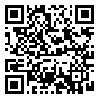Volume 3, Issue 3 (11-2009)
2009, 3(3): 69-79 |
Back to browse issues page
Download citation:
BibTeX | RIS | EndNote | Medlars | ProCite | Reference Manager | RefWorks
Send citation to:



BibTeX | RIS | EndNote | Medlars | ProCite | Reference Manager | RefWorks
Send citation to:
Oreyzi H R, darami Z. Validation and effect of effort-reward imbalance model on fatigue, emotional exhaustion, psychosomatic complaints and physical health of employees. Research in psychological health 2009; 3 (3) :69-79
URL: http://rph.khu.ac.ir/article-1-117-en.html
URL: http://rph.khu.ac.ir/article-1-117-en.html
1- , n_darami@yahoo.com
Abstract: (12752 Views)
Employees expect respect from their co-workers and supervisors and guarantee of job security which is appropriate for their efforts in the workplace. Also, those with overcommitment to work need to be more supported. A set of these variables are included in the effort-reward imbalance model. The objectives of this study were to assess validity of the ERI model and its effects on fatigue, emotional exhaustion, physical health and psychosomatic complaints. To test validity of ERI model, a sample of 235 personnel of an industrial company in Isfahan, Iran, was selected. To measure predictor variables, ERI questionnaire (Zurlo, Pes & Siegrist, 2010) was used. To measure criterion variables Including fatigue, emotional exhaustion, physical health and psychosomatic complaints, fatigue scale (Chalder & et al,1993),emotional exhaustion scale(Malach,1998),Physical health scale (Hilderbrandt & et al, 1991) and psychosomatic complaints scale(Driken,1969) were used respectively. Factor analysis of ERI scale elicit four subscale namely job security, respect, effort and overcommitment with favorable stability. The results showed that there was a positive relation between two subscales of respect and job security and criterion variables. There was also a negative relation between two subscales of effort and overcommitment and criterion variables. The results of this study can be of prime importance for the improvement of personnel’s health in the industrial environments.
Keywords: Effort-Reward Model, Overcommitment, Emotional Exhaustion, psychosomatic complaints, Physical Health
Type of Study: Research |
Published: 2009/11/15
Published: 2009/11/15
Send email to the article author
| Rights and permissions | |
 | This work is licensed under a Creative Commons Attribution-NonCommercial 4.0 International License. |





